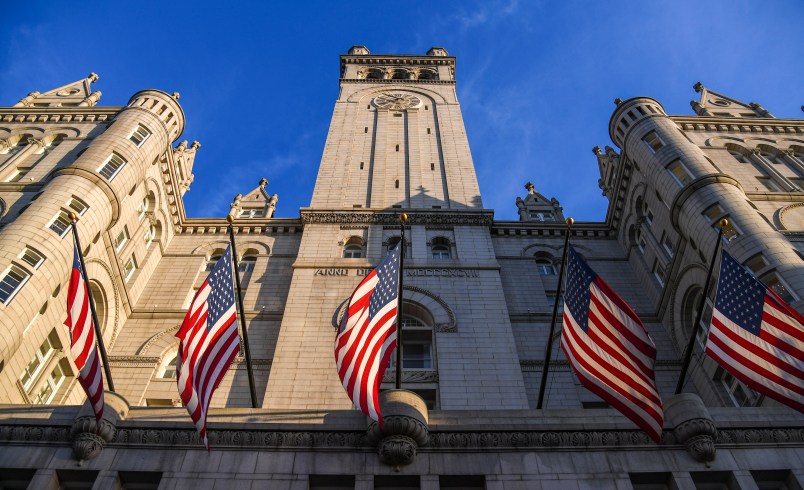A Richmond federal appeals court was united on Thursday on one question: the emoluments issues raised by President Trump’s ownership of hotels while in office are virtually without precedent.
The questions of exactly how and why a case brought was unprecedented, however, left judges split along partisan and ideological lines.
“It’s not just this President we’re talking about, but about every future president, and what we do today is gonna apply across the board,” noted Judge James A. Wynn Jr.
Judge J. Harvie Wilkinson III indicated throughout oral arguments in the case, which was brought by two state-level attorneys general over an alleged constitutional violation, that he would favor throwing the case out immediately. At one point, he called it a “lemon.”
“There is no evidence that the President has directly harmed anyone — we’re up here making it up, we’re winging it, there’s no history that authorizes it, no precedent that authorizes it,” Wilkinson said.
The Fourth Circuit Court of Appeals made the rare decision in October to rehear arguments in the case in full session, giving attorneys general for Maryland and D.C. the opportunity to reargue their case against President Trump after a three-judge panel dismissed the case without ruling on the merits in July.
Judges at the Thursday hearing went over time on questioning attorneys for both sides, with Justice Department lawyer Hashim Mooppan representing the President and D.C. Solicitor General Loren AliKhan arguing for the plaintiffs.
Khan described the case as being “on firm footing,” adding that “other courts have not hesitated to restrain unconstitutional action by federal officers.”
Khan argued that Trump, by owning his hotels and receiving emoluments from foreign officials, creates an unfair competitive advantage versus similar options in D.C. and Maryland.
“We can offer the same amenities, but we cannot offer the ability to ingratiate the President,” she said, asking the court to order Trump to cease taking payments from foreign officials.
The matter at issue was less broad than the constitutional and historical questions that the judges often discussed at the Thursday arguments, however. Rather, the full court is set to decide whether the district court in the case abused its authority by denying Trump the right to a writ of mandamus — a legal maneuver that effectively allows an appeals court to intercede in the proceedings.
Mooppan, the Justice Department attorney, argued that “without an express authorization by Congress, [the President] cannot be sued in his official nature.”
When a judge pointed out that Trump said in October that he is the victim of the “phony emoluments clause,” the DOJ attorney replied that Trump was calling “the claims phony,” and not the constitutional provision itself.
“No one is disputing that the emoluments clauses exist,” Mooppan added. “And that they are important.”
At one point, Judge Wynn asked Mooppan “what official duties by the President would be impaired” by the relief sought in the case — forcing Trump to divest from his businesses or preventing him from receiving further profits from them.
Moopan replied that Trump would then be “penalized for office” by the requested relief. The DOJ lawyer likened it to someone telling “you that you can no longer be a federal judge until you give up all your money.”
“That’s not the relief that’s requested,” the judge replied, asking Mooppan again what official duties would be impaired by an injunctive relief that forced Trump to stop accepting payments.
“I can’t give you a better answer than what I’ve given you,” Mooppan replied.






